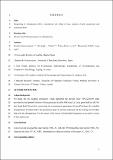Bargaining in chimpanzees (Pan troglodytes) : the effect of cost, amount of gift, reciprocity and communication
Abstract
Humans routinely incur costs when allocating resources and reject distributions judged to be below/over an expected threshold. The Dictator/Ultimatum Games (DG/UG) are two-player games that quantify prosociality and inequity aversion by measuring allocated distributions and rejection thresholds. Although the UG has been administered to chimpanzees and bonobos, no study has used both games to pinpoint their motivational substrate. We administered a DG/UG using pre-assigned distributions to four chimpanzee dyads controlling for factors that could explain why proposers’ behavior varied substantially across previous studies: game order, cost for proposers and amount for recipients. Moreover, players exchanged their roles (proposer/recipient) to test reciprocity. Our results show that proposers offered more in the DG than in the non-social baseline, particularly when they incurred no cost. In UG, recipients accepted all above-zero offers, suggesting absence of inequity aversion. Proposers preferentially chose options that gave larger amounts to the partner. However, they also decreased their offers across sessions, probably being inclined to punish their partner’s rejections. Therefore, chimpanzees were not strategically motivated towards offering more generously to achieve ulterior acceptance from their partner. We found no evidence of reciprocity. We conclude that chimpanzees are generous rational maximizers that may not engage in strategic behavior.
Citation
Bueno-Guerra , N , Voelter , C J , de las Heras , Á , Colell , M & Call , J 2019 , ' Bargaining in chimpanzees ( Pan troglodytes ) : the effect of cost, amount of gift, reciprocity and communication ' , Journal of Comparative Psychology , vol. Online First . https://doi.org/10.1037/com0000189
Publication
Journal of Comparative Psychology
Status
Peer reviewed
ISSN
0735-7036Type
Journal article
Description
Authors thank the two funding institutions which supported the present study: FPU12/00409 grant provided by the Spanish Ministry of Education and held by NBG and La Caixa grant held by AD.Collections
Items in the St Andrews Research Repository are protected by copyright, with all rights reserved, unless otherwise indicated.

